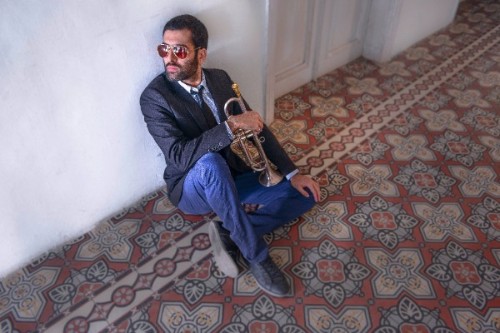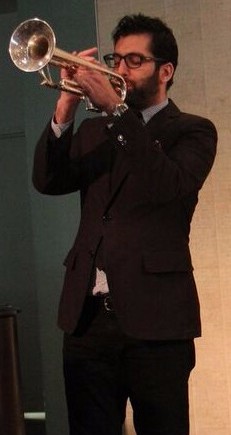Revitializing the Roots: Borochov Drops Boomerang

In Honor of Judge Abraham D. Sofaer, Co-Founder and Board Member of the National Jazz Museum in Harlem

Sephardi Ideas Monthly is a continuing series of essays from the rich, multi-dimensional world of Sephardi thought that is traditionally delivered to your inbox on the second Monday of every month.
At its peak, Sephardi Jewish history has been marked by artistic excellence that unites refined spiritual sensibilities with world-class, aesthetic achievement. Characterized by the capacity to deeply integrate both Jewish and worldly elements in their work, great figures from this tradition of excellence ranged from the Jewish poets of Golden Age al-Andalus to the 20th century’s Jewish musicians of Iraq. With the release of Boomerang, perhaps the time has come to add a new name to this distinguished list: Itamar Borochov, the Israel-born and New York-based jazz musician.

(Photo courtesy of Irina Tsukerman)
Itamar Borochov’s Boomerang
Friends of Sephardi Ideas Monthly and the American Sephardi Federation probably recognize the name Itamar Borochov. The February, 2016, issue of Sephardi Ideas Monthly featured an interview with Borochov, “Revitalizing the Roots,” while Itamar graciously agreed to perform at the ASF’s “Daniel Pearl Concert” in 2014 and, in 2015, played at the opening of “Sephardic Journeys: An Evening of Exploration.”
During the past few years, Borochov’s career has taken him to the top tier of the jazz world, with performances in festivals around the world as well as classic New York venues such as Dizzy’s Club (Jazz at Lincoln Center). Living in New York since 2007 and schooled in the hard bop style, Borochov has also drawn inspiration and material from Sephardi musical traditions, participating in the New Jerusalem Orchestra’s jazz-inflected interpretations of Andalusian piyyut, Eternal Love (2010), recording and touring with the Yemenite-Arabic flavored Yemen Blues (2010), and, this past year, delving into the world of ancient Bukhari music with, Borochov Dynasty: A Fantasy of Bukharian Sacred Music (2016).
Borochov, though, didn’t set out to mine Sephardi musical traditions. Instead, his “Sephardi turn” is of a piece with the history of jazz and part and parcel of his evolution as a jazz artist.
Music Video:

(Photo courtesy of Aviram Valdman/The Tower)
As noted by the ASF’s Director of Publications, Aryeh Tepper, in the liner notes that Tepper composed to accompany Boomerang, “Jazz from its inception was a musical hybrid, and by integrating Jazz form and ‘ethnic music’ Borochov is extending the Jazz tradition out of the resources of the tradition itself.” Tepper continues:
In 2007, at the age of twenty-three, Borochov relocated to the States with the intention of immersing himself in the Jazz tradition, but he received a wake-up call one day when hard-bop icon Nathan Davis told him, “We want you to be you.” That’s when Borochov understood that there’s no safety net, “I have to be real. If Coltrane was informed by his father being a preacher, I had to do the same thing. Lee Morgan’s from Philly and I’m from Jaffa. He brought gospel and I’m bringing Sephardi synagogue music.” To be clear, “Sephardi synagogue music” in this context stands for all of the influences that Borochov absorbed growing up in a Bukharin-Jewish family in an ethnically diverse town in Israel, synagogue music among them.
It would be a mistake to reduce Borochov’s connection to Sephardi traditions to purely aesthetic concerns. Ultimately his connection, while unorthodox, is deeply religious:
Borochov is a deep believer, but of a Middle Eastern variety that is rarely found in the West. In the Middle East, religious tradition is natural like the air you breathe, or the food you eat, and Borochov catches glimpses of the Divine in various settings, both sacred and profane, from rows of tangerines to the neighborhood synagogue to late night on Jones Street.
Like the great Sephardi figures of the past Borochov refuses to strictly separate the sacred from the mundane, and his music accordingly celebrates, “the traces of the Divine that Borochov finds in elegant sophistication, Middle Eastern tradition and downhome blues.” Thus, at its deepest, his music becomes profoundly Jewish: “Taking the long view, you can say that Borochov is adding a layer of musical commentary to the old Hebrew standard, ‘All the earth is full of His glory.’”
Itamar Borochov’s disk, Boomerang, is set to be released on the Laborie Jazz label this month, and Sephardi Ideas Monthly is extremely pleased to feature Aryeh Tepper’s liner notes to the album, as well as a song from the disk, Borochov’s swinging tribute to his Arab-Jewish hometown, “Jaffa Tune.”
Sephardi Ideas Monthlywould like to thank the Laborie Jazz Label for their kind permission to reprint the liner notes.
 Liberated Libyan Holocaust Survivors (Photo courtesy of Yad Vashem) Benghazi Bergen-Belsen Special Staged Reading with Yossi Sucary and La Mama Theatres Company November 14th at 7PM Center for Jewish History 15 W 16th Street New York, NY 10011 Join the American Jewish Historical Society and American Sephardi Federation in celebrating the English-language publication of Benghazi Bergen-Belsen (click here to readThe Sephardi World Weekly’s coverage), the first novel exploring the experiences of Libyan Jews in the Holocaust. Hear a staged reading from the upcoming theatrical adaptation of the novel, premiering at La Mama Theatre in March 2017, and meet author Yossi Sucary for the post-reading Q&A session. Please click here for tickets (Tickets:$7 AJHS or ASF Members; $15 General Admission) |
 Portugal, The Last Hope: Sousa Mendes’ Visas for Freedom April 7th through October 2016 Center for Jewish History 15 W 16th Street New York, NY 10011The American Sephardi Federation, Portuguese Consulate of New York, the Sousa Mendes Foundation, and the Municipality of Almeida, Portugal proudly present a new exhibition in the Leon Levy Gallery honoring Aristides de Sousa Mendes, the courageous and creative Portuguese diplomat who saved Salvador Dali, the authors of Curious George, and thousands of other Holocaust refugees. Please click here for viewing hours |
| Donate now and your tax-deductible contribution will help ASF “Connect, Collect, and Celebrate” Sephardi culture throughout the year with engaging programs and compelling publications. |